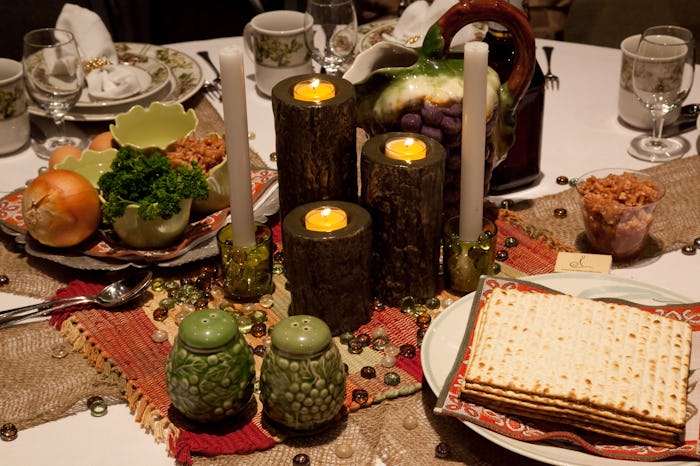Life

5 Ways To Have A Feminist Passover & Empowering Seder
Grab your matzah and Manishevitz, because Passover is almost here. The yearly spring Jewish holiday commemorates the ancient Israelite’s freedom from Egyptian slavery. Yet, it also has the power to acknowledge how far the Jewish community has to go. In many communities, women fully participate in synagogue life, whether it be on the pulpit as rabbis and cantors, in synagogue leadership, or contributing to the cannon of art, literature or music. But even those who are inclusive don’t always remember to acknowledge the connections between feminism and Passover. This year, try to find ways to have a feminist Passover Seder that are intentionally and unapologetically empowering.
Now, that's not to say that a feminist Passover would be something super groundbreaking. According to Tablet Magazine, The first feminist Passover seder was held in Haifa, Israel, in 1975 . Since then, women-only seders have become a staple of synagogue sisterhoods. But no matter the people gathered around your table, your Passover can include feminist elements like an orange on the seder plate, a goblet filled with water, and even a Beyoncé playlist. This year, while you’re mastering your Bubbe’s brisket recipe, check out these five ways to give your Passover Seder a feminist makeover.
1Tell The Story Using Female Characters
Your standard Passover haggadah manages to tell the Exodus story only using the male characters of Moses, Pharaoh and God, completely forgetting that five women were crucial to making it all happen. Ensure that the story is complete (and accurate) by including the achievements of the female characters: Yocheved, Moses’ mother was the one who hid him in the Nile River; Shifra and Puah were the Hebrew midwives who saved Israelite baby boys from being killed; Miriam, Moses’ sister, who watched out for him as he floated away; and Pharaoh’s Daughter (yes, her real name) who found him and raised him inside the palace. Long story short, who runs the world? Girls.
2Spice Up Your Seder Plate
The traditional Seder plate has sections for all of symbols of the holiday: a roasted egg for life, a green vegetable for springtime, bitter herbs for the pain of slavery, charoset for the mortar the Israelites used to build in Egypt, and a roasted bone symbolic of the lamb’s blood used to mark the door frames of the Israelites.
For a feminist holiday, make sure your Seder plate includes a symbol for modern forms of slavery. One symbol could be an orange to bear homage to the inclusion of women and LGBT people in Jewish life. Other options are an olive for peace in the Middle East, or Fair Trade chocolate for worker’s rights. Whatever you add, it should get the people around your table asking questions.
3Make Your Own Miriam’s Cup
The Seder table is full of wine glasses—one for each person that is filled four times throughout the Seder and an extra glass for Elijah, the prophet thought to hearken the Messianic Era. It has become common to add a goblet of water for Miriam, the sister of Moses whose presence, strength, foresight, and leadership gifted her a well that followed her and the Israelites through the desert.
To get people talking, start with an empty cup and ask each participant to name a woman in their life who they admire or learn from. As they share, invite them to pour water from their own cup into Miriam’s. For extra points, play Debbie Friedman’s iconic “Miriam’s Song.”
4Keep It Current
Use resources from American Jewish World Service or the Hebrew Immigrant Aid Society, to infuse your Seder with the stories of women who are still enslaved today. Learn about sexual assault on college campuses, child marriage, and Orthodox women who are unable to obtain divorces. Talk to the people around your table about how to make a difference to women around the globe. And, for a little ambiance, create a playlist of female artists to play during the festive meal
5Declare Your Feminist Freedom from Stress
Be it stereotype or truth, women are often the ones who take on the brunt of Passover cooking, cleaning, and hosting. That comes on top of our regular responsibilities to work and family. This combination can lead to feelings of anxiety, stress, and inadequacy—something women know all too well. Why not let your feminist Seder be a place free from unreasonable expectations and unmet deadlines?
During the Seder we are commanded to recline, to physically show our status as free human begins. This year while reclining, think about freeing yourself from the cultural noise around food, perfection, and achievement. Instead of worrying about the calories in a piece of chocolate matzah, enjoy the once-a-year dessert. Same goes for the red wine stains on your tablecloth or sticky fingers all over the nice wine glasses. Instead of taking the perfect seder photo for your Instagram, celebrate the holiday in all of its sacred messiness with the people you love. Have a Happy Passover!